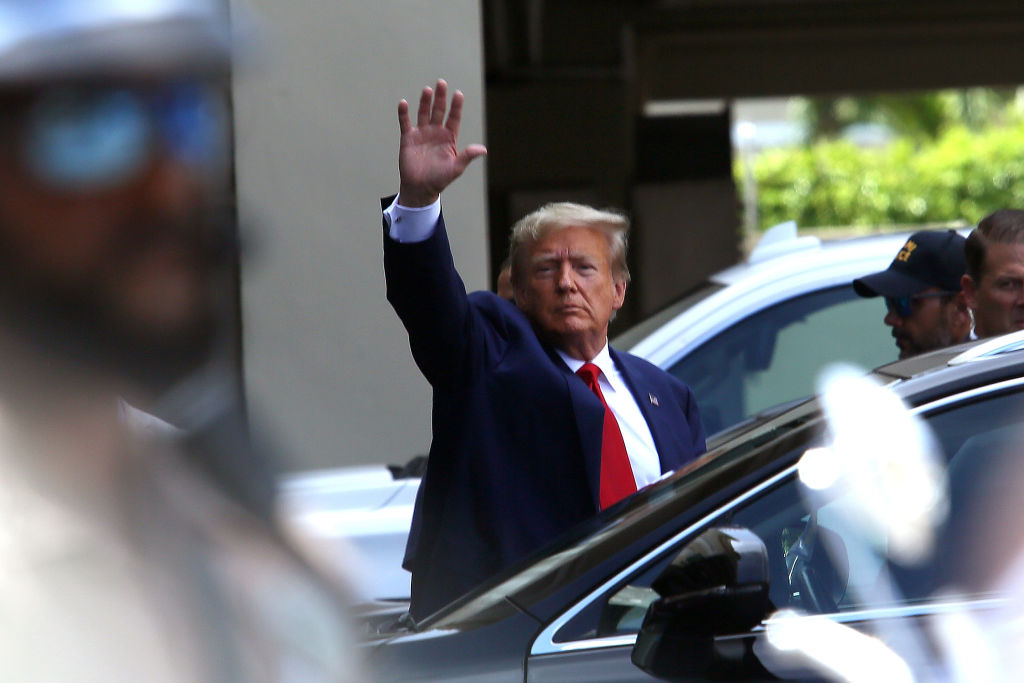Georgia law makes it likely that former President Donald Trump’s arraignment on the indictment handed up Monday in Fulton County will be televised.
Cameras were barred from courtrooms at Trump’s previous three arraignments this year — one in New York City on charges of falsifying business records, one in Miami on federal charges of mishandling classified documents, and one in Washington on charges of conspiracy and obstruction related to his challenges to the 2020 presidential election.
The former president faces 11 counts in the latest indictment against him. No date for his arraignment had been set as of Tuesday morning.
Georgia law calls judicial proceedings to be televised, subject to a judge’s approval, NBC News noted.
In 2018, the state’s Supreme Court added smartphones to the list of devices allowed and opined, “Open courtrooms are an indispensable element of an effective and respected judicial system.
“It is the policy of Georgia’s courts to promote access to and understanding of court proceedings not only by the participants in them but also by the general public and by news media who will report on the proceedings to the public,” the court said at the time.
The NBC report said media organizations must request access but the filing “is often considered more of a formality, as the requests are almost always granted.”
According to WANF-TV in Atlanta, cameras are generally allowed in Georgia courts barring a significant reason to keep them out, such as to protect a juvenile defendant.
“Georgia courts traditionally have allowed the media and the public in so that everyone can scrutinize how our process actually works,” attorney Josh Schiffer said. “Unlike a lot of states with very strict rules, courts in Georgia are going to basically leave it up to the judges.”
“When you have independent monitors — that being the public, the press, academics — watching our process actually function, not necessarily the way it was written about in the books but how it really works, only by having that transparency can good complaints rise to the top and be dealt with,” he said. “And it’s all in an effort to make the process work better to produce justice.”
Fulton County Superior Court Judge Robert C.I. McBurney likely will preside over Trump’s arraignment, according to WXIA-TV in Atlanta.
McBurney allowed cameras in the courtroom Monday night when the former president’s indictment was handed up.
Reuters speculated that an arraignment might not take place.
“Trump’s attorney could ask the court to waive the arraignment, and he could enter a plea of not guilty without appearing in court,” it reported, noting that bail must be set.
WXIA also speculated on the case, saying, “It’s also possible Trump’s lawyers would have negotiated a bond with the DA’s Office ahead of time. Many times a first appearance in Georgia is also waived entirely.”
“Unless somebody tells me differently, we are following our normal practices, and so it doesn’t matter your status, we’ll have a mugshot ready for you,” Labat said.
Melissa Redmon, a University of Georgia Law professor and former Fulton County prosecutor, said after the initial stage, things might move slowly, according to WXIA.
“You’ll see the pretrial motions to dismiss, and attorneys stating why the case should be dismissed, so those should be the initial motions and then if the case survives, then motions on what type of evidence is admissible or should be excluded, so then those get litigated,” she said. “All that would happen before you actually get to scheduling when the trial would occur.”
Redmon said Trump’s team might want to slow down the process.
“You have the election cycle coming up so their motivation would be to not have to deal with this until later on, so I think it would be more pretrial motions, appeals of however those motions — whichever way the judge rules on those motions — so that would lend to a delay before you even get to jury selection,” she said.
This article appeared originally on The Western Journal.
























